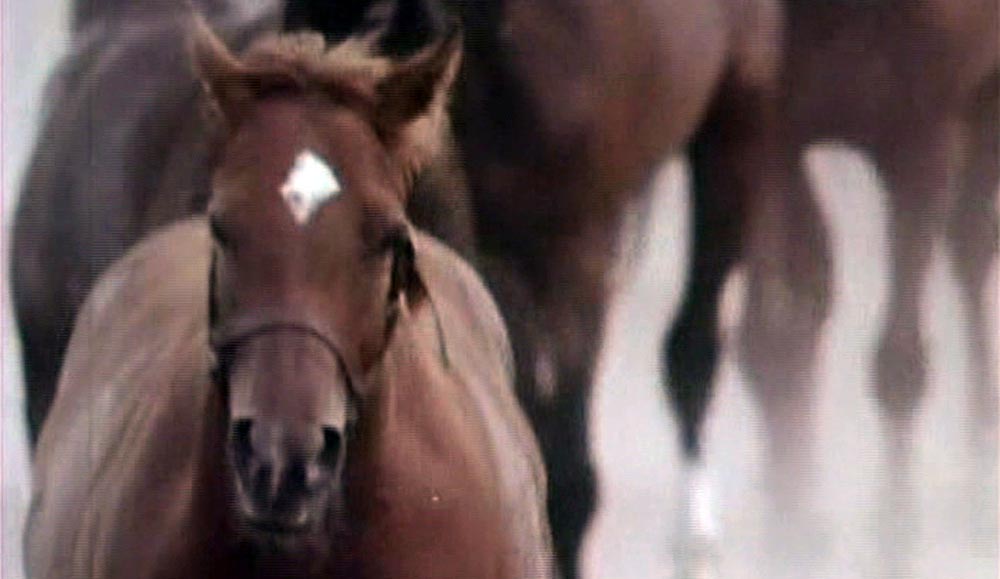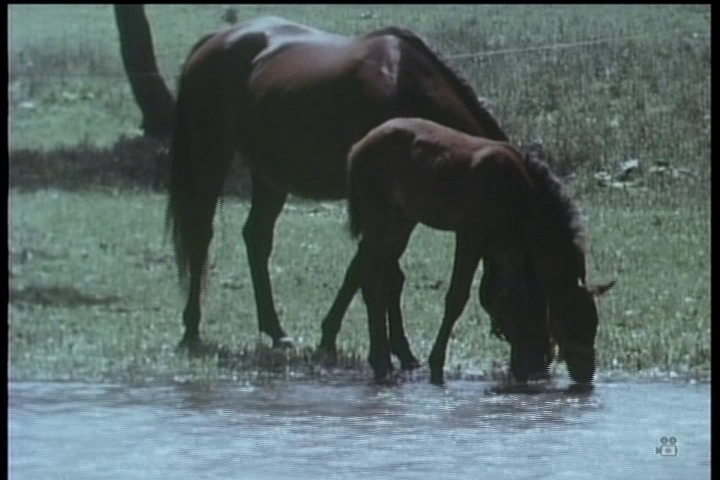
Akira Kurosawa’s 1971 film Song of the Horse has long been something of a mystery for many Kurosawa aficionados. The film, Kurosawa’s only television project, has been entirely overlooked by Kurosawa critics, so much so that it is usually not even included in the director’s filmography. It is also routinely left out of Kurosawa’s biography: for instance, Stuart Galbraith devotes altogether two and a half sentences to the film in his generally exhaustive 800+ page Kurosawa-Mifune biography. Even the film’s release year has, it turns out, been a mystery: it is typically listed as having first aired in August 1970, yet the film must actually have been first broadcast at least a year later, as evidenced by the fact that it includes footage from events that took place in the summer of 1971.
There is a fairly good reason for all this. While other Kurosawa films have been released in various home video formats over the years, Song of the Horse has remained largely unavailable for the general public ever since its initial television broadcast. Few have actually seen the film.
I am therefore extremely excited to report that this has now changed, with a DVD release from the US based independent publisher Samurai DVD. And it comes with English subtitles.
This appears to be a good example of the modus operandi at Samurai DVD. The owner, who has been following Japanese cinema since the 1960s and produced subtitled releases since the 1980s, sources films from Japan that are unavailable in the west, has English subtitles added to them, and repackages them for sale. As the owner told me by email, this is pretty much done as a labour of love. With Song of the Horse, the process was apparently a little different though, as the video came from a Japanese source with ready subtitles.
So, what is the Samurai DVD release of Song of the Horse like? Is it worth the admission price of $19.95 (discounted at the time of writing to $14.95)?
Well, obviously this is no Criterion release. The region-free DVD comes with just the film, and nothing else. That also means that there are no menus. You pop in the DVD, press play, and off you go. The disc itself is very plain looking and there is no booklet or information outside of the DVD cover.
But when it comes to things that actually matter, the picture and sound quality are fairly good, at least if you know what to expect from a 1970s Japanese TV film. We are obviously not talking about high definition resolution here (720×480 is what you get), the image is often fairly blurry and the colours are quite washed out. But this is not the DVD’s fault: one has to bear in mind that the film itself was low budget, so all of this should be expected. To put it into a familiar perspective, this is about the same as watching a Criterion Eclipse release. No remastering has been done to the film, but the source is relatively good. I have added over a hundred screenshots to the screenshots section of the new Song of the Horse filmography page to give you an even better idea of the quality.

The removable English subtitles are also very good, in fact better than what we have on some more official Kurosawa releases. So, if terms like “sourced from Japan”, “subtitles added” and “region-free DVDs” made you think about old Chinese Kurosawa releases like the infamous Mei-Ah discs, this is nothing like their often nonsensical Japanese-to-Chinese-to-English translations. No one declares themselves to be the tuberculosis here. This is proper subtitles.
And what about the film itself? Well, Song of the Horse is a 73-minute documentary about thoroughbred race horses, shot by Kurosawa and voice-over narrated by a fictional pair of a man and a child (same actors as the beggar and his son in Dodesukaden). It is more visual than it is informative, with long stretches of the film simply showing horses running. You will most probably not learn all that much new about horses from this film. What it shows instead is Kurosawa’s love for horses, reflecting in how the camera embraces these creatures. Kurosawa’s knack for storytelling is also present, as both the structure of the film and the fictional narrators add something of a story layer to the otherwise fairly plotless documentary.
In many places the voice of Kurosawa can also be heard — not literally, but through the silent commentary offered by the camera. There are even a few apparent references to Kurosawa’s earlier work, most notably a Rashomonesque shot of the sun through forest foliage, as well as a few distant echoes of what would be seen in the director’s later films.
For more information about the film, check out the brand new filmography section for Song of the Horse.
So, should you buy the DVD? If you have seen all or most other Kurosawa films and crave for more, then definitely and absolutely yes. It has, after all, been something of a holy grail for years, and all things considered this is a good quality release. If you have seen everything else, this will probably be the last time that you will be able to watch a “new” Kurosawa film, ever again. Just let that sink in for a moment.
On the other hand, if your interest is only in Kurosawa’s major works, I would say that you can safely skip Song of the Horse. While both beautiful and interesting, it certainly doesn’t rank with the director’s main body of work.
Song of the Horse is available from the Samurai DVD online store. My own customer experience was positive: the order was shipped very promptly and delivery was also swift. The package reached me in Central Europe in just over a week.
If you decide to order the disc, I thought I should mention that the website has also other hard-to-find Kurosawa related films on offer: Snow Trail, Fencing Master (both the 1950 and 1962 versions) and Vendetta of Samurai were all penned by Kurosawa, as of course were After the Rain and in a manner of speaking the 2007 remake of Sanjuro. The store also offers plenty of films with Toshirō Mifune and Tatsuya Nakadai. I cannot, however, vouch for the quality of any of these films as I have yet to take a look at the rest of the DVDs that I ordered.
Sincere thanks to @magadizer for alerting me on Twitter about this sudden availability of Song of the Horse!






The horse awakens.